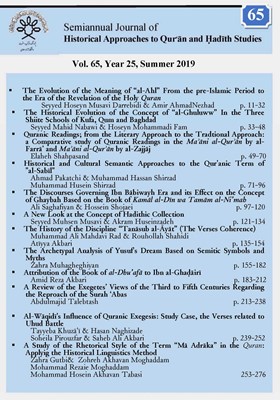Al-Wāqidī’s Influence of Quranic Exegesis Study Case, the Verses related to Uhud Battle
Subject Areas : -tayyebe khazaee 1 , hassan naghizade 2 * , soheila pirouzfar 3 , Sahebali Akbari 4
1 - PH. D. student in Quran and Hadith Studies, International Branch, Ferdowsi University of Mashhad, Mashhad. Iran.
2 - Professor in Quran and Hadith Studies, Ferdowsi University of Mashhad, Mashhad, Iran
3 - Associated professor in Quran and Hadith Studies, Ferdowsi University of Mashhad, Mashhad. Iran.
4 - Associated Professor in Quran and Hadith Studies, Ferdowsi University of Mashhad, Mashhad, Iran.
Keywords: the Battle of Uhud, Quranic Exegesis, Wāqidī, al-Maghāzī, Surah Āl ‘Imrān,
Abstract :
Abū Abdullah Muhammad Ibn Wāqidī was a 2nd century AH historian, who in his book “Al-Maghāzī” at the end of studying each battle of the Prophet based on the Quran’s Surahs, commented on the details of the story and clarified the words like a commentator who explained the meaning of the verses. Repeated references of different commentators to his book in various times in the history shows that it is not only an important source in the Islamic history, but also a trusted reference for the commentators. The present study, with an analytical – descriptive approach case study of the Battle of Uhud, tried to find different forms of Wāqidī’s explanations in interpretation and the stances of other commentators from the third to the tenth century AH in three different areas of narrating, referencing, and rejecting his explanations. Based on the findings of this study, Wāqidī’s narrations in commentaries of 17 verses from 22 verses especially in illustrating historical details based on Quran’s verses, Hadiths, and verses form were accepted by commentators. His narrations are traced in other references according to the time and the audiences, as his interpretations are more significant in narrative and Ijtihādi commentaries of the sixth century AH.
_||_

